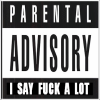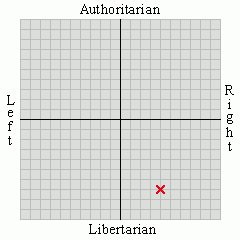Monday, 15 February 2010
Subscribe to:
Post Comments (Atom)
Thoughts of a libertarian British expat Down Under
Bad language is inevitable.
Due to the move of the blog to Wordpress posts from Jan 2012 onward will have commenting disabled (when I remember to do it)
Cheers - AE






The non-violent state will be an ordered anarchy. That State is the best governed which is governed the least.
In no longer pretty cities
There are warrants, forms and chitties
There are fingers in the kitties
And a jackboot on the stair.
Sometimes it is said that man can not be trusted with the government of himself. Can he, then, be trusted with the government of others? Or have we found angels in the forms of kings to govern him? Let history answer this question.
They who can give up essential liberty to obtain a little temporary safety, deserve neither liberty nor safety.
If all mankind minus one were of one opinion, mankind would be no more justified in silencing that one person than he, if he had the power, would be justified in silencing mankind.
Necessity is the plea for every infringement of human freedom. It is the argument of tyrants; it is the creed of slaves.
Coercion, after all, merely captures man. Freedom captivates him.
Never give your government any power that you wouldn't also be comfortable entrusting to a genocidal dictator.
Of all tyrannies, a tyranny exercised for the good of its victims may be the most oppressive. It may be better to live under robber barons than under omnipotent moral busybodies. The robber baron's cruelty may sometimes sleep, his cupidity may at some point be satiated; but those who torment us for our own good will torment us without end, for they do so with the approval of their own conscience.
America is at that awkward stage. It's too late to work within the system, but too early to shoot the bastards.
The powers delegated to the government must be precisely defined … and clearly be of such extent as that, by no reasonable construction, they can be made to invade the rights and prerogatives intended to be left in the people.
It will be of little avail to the people, that the laws are made by men of their own choice, if the laws be so voluminous that they cannot be read, or so incoherent that they cannot be understood; if they be repealed or revised before they are promulgated, or undergo such incessant changes that no man, who knows what the law is to-day, can guess what it will be to-morrow. Law is defined to be a rule of action; but how can that be a rule, which is little known, and less fixed?
A charity that relies in the main part on taxes is no more a charity than a prostitute is your girlfriend.
Politicians are the only people in the world who create problems and then campaign against them.
Democracy never lasts long. It soon wastes, exhausts and murders itself. There was never a democracy that did not commit suicide.
Government’s view of the economy can be summed up in a few short phrases: If it moves, tax it. If it keeps moving, regulate it. And if it stops moving, subsidise it.
It's amazing to me how many people think that voting to have the government give poor people money is compassion. Helping poor and suffering people is compassion. Voting for our government to use guns to give money to help poor and suffering people is immoral self-righteous bullying laziness ... There is great joy in helping people, but no joy in doing it at gunpoint.
“And how we burned in the camps later, thinking: What would things have been like if every Security operative, when he went out at night to make an arrest, had been uncertain whether he would return alive and had to say good-bye to his family? Or if, during periods of mass arrests, as for example in Leningrad, when they arrested a quarter of the entire city, people had not simply sat there in their lairs, paling with terror at every bang of the downstairs door and at every step on the staircase, but had understood they had nothing left to lose and had boldly set up in the downstairs hall an ambush of half a dozen people with axes, hammers, pokers, or whatever else was at hand? [...] We didn't love freedom enough. And even more – we had no awareness of the real situation.... We purely and simply deserved everything that happened afterward.”
Into our town the Hangman came,
Smelling of gold and blood and flame.
And he paced our bricks with a diffident air,
And built his frame in the courthouse square.
The scaffold stood by the courthouse side,
Only as wide as the door was wide;
A frame as tall, or little more,
Than the capping sill of the courthouse door.
And we wondered, whenever we had the time,
Who the criminal, what the crime
That the Hangman judged with the yellow twist
of knotted hemp in his busy fist.
And innocent though we were, with dread,
We passed those eyes of buckshot lead --
Till one cried: "Hangman, who is he
For whom you raised the gallows-tree?"
Then a twinkle grew in the buckshot eye,
And he gave us a riddle instead of reply:
"He who serves me best," said he,
"Shall earn the rope of the gallows-tree."
And he stepped down, and laid his hand
On a man who came from another land.
And we breathed again, for another's grief
At the Hangman's hand was our relief
And the gallows-frame on the courthouse lawn
By tomorrow's sun would be struck and gone.
So we gave him way, and no one spoke,
Out of respect for his Hangman's cloak.
The next day's sun looked mildly down
On roof and street in our quiet town,
And stark and black in the morning air
Was the gallows-tree in the courthouse square.
And the Hangman stood at his usual stand
With the yellow hemp in his busy hand;
With his buckshot eye and his jaw like a pike
And his air so knowing and business-like.
And we cried, "Hangman, have you not done
Yesterday, with the foreign one?"
Then we fell silent, and stood amazed,
"Oh, not for him was the gallows raised."
He laughed a laugh as he looked at us:
"Did you think I'd gone to all this fuss
To hang one man? That's a thing I do
To stretch a rope when the rope is new."
Then one cried "Murder!" and one cried "Shame!"
And into our midst the Hangman came
To that man's place. "Do you hold," said he,
"with him that was meant for the gallows-tree?"
And he laid his hand on that one's arm.
And we shrank back in quick alarm!
And we gave him way, and no one spoke
Out of fear of his Hangman's cloak.
That night we saw with dread surprise
The Hangman's scaffold had grown in size.
Fed by the blood beneath the chute,
The gallows-tree had taken root;
Now as wide, or a little more,
Than the steps that led to the courthouse door,
As tall as the writing, or nearly as tall,
Halfway up on the courthouse wall.
The third he took -- we had all heard tell --
Was a usurer, and an infidel.
"What," said the Hangman "have you to do
With the gallows-bound, and he a Jew?"
And we cried out, "Is this one he
Who has served you well and faithfully?"
The Hangman smiled: "It's a clever scheme
to try the strength of the gallows-beam."
The fourth man's dark, accusing song
Had scratched our comfort hard and long;
"And what concern," he gave us back.
"Have you for the doomed -- the doomed and Black?"
The fifth. The sixth. And we cried again,
"Hangman, Hangman, is this the man?"
"It's a trick," he said. "that we hangmen know
For easing the trap when the trap springs slow."
And so we ceased, and asked no more,
As the Hangman tallied his bloody score.
And sun by sun, and night by night,
The gallows grew to monstrous height.
The wings of the scaffold opened wide
Till they covered the square from side to side;
And the monster cross-beam, looking down,
Cast its shadow across the town.
Then through the town the Hangman came,
Through the empty streets, and called my name --
And I looked at the gallows soaring tall,
And thought, "There is no one left at all
For hanging, and so he calls to me
To help pull down the gallows-tree."
So I went out with right good hope
To the Hangman's tree and the Hangman's rope.
He smiled at me as I came down
To the courthouse square through the silent town.
And supple and stretched in his busy hand
Was the yellow twist of the hempen strand.
And he whistled his tune as he tried the trap,
And it sprang down with a ready snap --
And then with a smile of awful command
He laid his hand upon my hand.
"You tricked me. Hangman!," I shouted then,
"That your scaffold was built for other men...
And I no henchman of yours," I cried,
"You lied to me, Hangman. Foully lied!"
Then a twinkle grew in the buckshot eye,
"Lied to you? Tricked you?" he said. "Not I.
For I answered straight and I told you true --
The scaffold was raised for none but you.
For who has served me more faithfully
Then you with your coward's hope?" said he,
"And where are the others who might have stood
Side by your side in the common good?"
"Dead," I whispered. And amiably
"Murdered," the Hangman corrected me:
"First the foreigner, then the Jew...
I did no more than you let me do."
Beneath the beam that blocked the sky
None had stood so alone as I.
The Hangman noosed me, and no voice there
Cried "Stop!" for me in the empty square.
